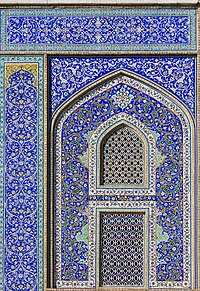Rauza, Rouza, Roza (Urdu: روضة, Bengali: রৌজা, Hindi: रौज़ा) is a Perso-Arabic term used in Middle East and Indian subcontinent which means shrine or tomb. It is also known as mazār, maqbara or dargah.
The word rauza is derived through Persian from the Arabic rawdah (روضة rawḍah) meaning garden, but extended to tomb surrounded by garden as at Agra and Aurangabad. Abdul Hamid Lahauri, the author of the Badshahnama, the official history of Shah Jahan's reign, calls Taj Mahal rauza-i munawwara (Perso-Arabic: روضه منواره rawdah-i munawwarah), meaning the illumined or illustrious tomb in a garden.
References
- Steingass, Francis Joseph (1992). A comprehensive Persian-English dictionary including the Arabic words and phrases to be met with in Persian literature; being Johnson and Richardson's Persian, Arabic and English dictionary ; revised, enlarged and entirely reconstructed (3. Repr. ed.). New Delhi: Asian Educational Services. p. 595. ISBN 9788120606708. Retrieved 9 February 2014.
- ^ Tillotson, Giles (2008). Taj Mahal. Cambridge, Massachusetts: Harvard University Press. p. 14. ISBN 9780674063655. Retrieved 9 February 2014.
- Becker, James (2010). The messiah secret. London: Bantam. p. 474. ISBN 9781407055800. Retrieved 9 February 2014.
- D'Rozario, P. S. (1837). A Dictionary of the Principal Languages Spoken in the Bengal Presidency: Viz. English, Bángálí, and Hindústání. In the Roman Character. G. Woollaston. p. 316. Retrieved 9 February 2014.
- Ward, Philip (1998). Gujarat, Daman, Diu : a travel guide. New Delhi: Orient Longman Ltd. p. 31. ISBN 9788125013839. Retrieved 9 February 2014.
| Islamic architecture | ||||||||||||||||||||
|---|---|---|---|---|---|---|---|---|---|---|---|---|---|---|---|---|---|---|---|---|
| Styles | ||||||||||||||||||||
| Elements |
| |||||||||||||||||||
| Types |
| |||||||||||||||||||
| Resources | ||||||||||||||||||||
| Influences | ||||||||||||||||||||
| Category pages | ||||||||||||||||||||
| Part of Islamic arts • | ||||||||||||||||||||
| Sufism terminology | ||
|---|---|---|
| Sufis |  | |
| Concepts | ||
| Awrad |
| |
| Waridates | ||
| Misconducts | ||
| Ceremonies | ||
| Arts | ||
| Places | ||
| Objects | ||
